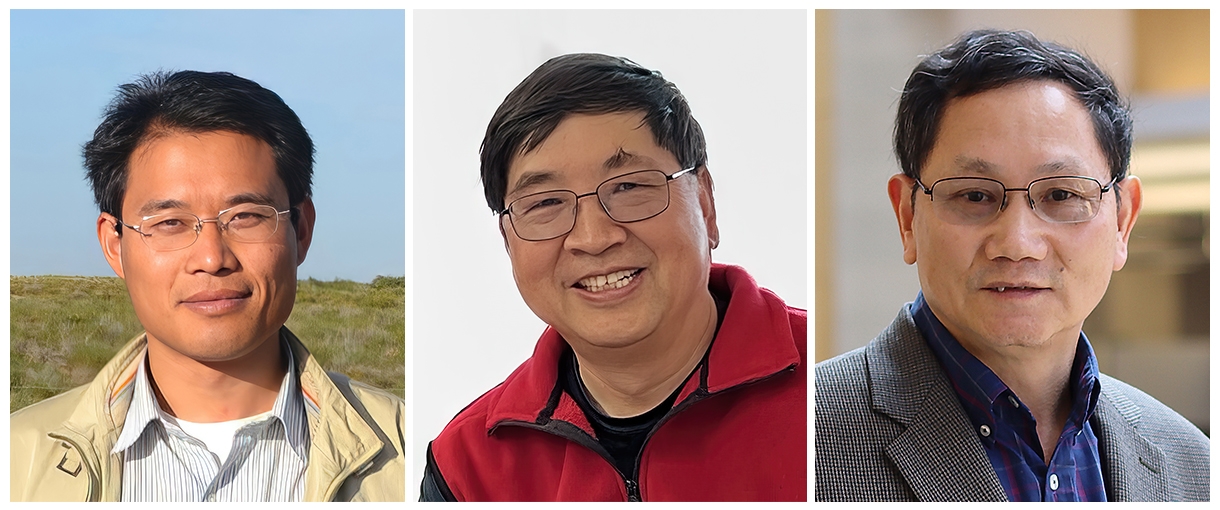Three researchers at the University of Oklahoma are named in Clarivate's Web of Science platform’s 2023 "Highly Cited Researchers" list, the most of any institution in Oklahoma. This annual list identifies 7,125 global researchers based on their production of multiple highly cited papers that rank in the top 1% by citations for field and year.
“We are immensely proud of these exceptional OU researchers, whose groundbreaking and prolific scholarship has propelled them into the echelons of the world’s leading minds in their respective fields,” said OU President Joseph Harroz Jr. “Their inclusion in this elite group not only attests to the quality and impact of their work but also underscores the University of Oklahoma’s trajectory as a top-tier public research institution.”
Yuanwei Qin and Xiangming Xiao, researchers with OU’s Center for Earth Observation and Modeling, ranked among the top 1% most highly cited in the field of geosciences. Jizhong Zhou, director of OU’s Institute for Environmental Genomics, is ranked twice as being among the most highly cited in both fields of microbiology and environment and ecology. Of this esteemed class of researchers, only 6% within this rank have the additional distinction of ranking among two categories.
Xiao is a professor of ecology and remote sensing in the School of Biological Sciences, Dodge Family College of Arts and Sciences, the director of the Center for Earth Observation and Modeling and an associate director of OU’s Institute for Resilient Environmental and Energy Systems. He recently achieved an h-index of 100, a prestigious milestone demonstrating the significance of a scholar’s research impact.
Xiao uses satellite data to measure, monitor, report and verify how cropland, grassland, forest, plantation, wetland, surface water, and urban environments worldwide change over time. He uses a “One Health” research approach that recognizes that the health of people is closely connected to the health of animals and our shared environment, as well as “GeoHealth” and “Big Data” science approaches to study ecology and epidemiology of zoonotic and vector-borne infectious diseases. Xiao serves as associate editor-in-chief for Frontiers of Earth Sciences, is a subject-matter editor for Ecological Applications, and a review editor for EcoHealth. He received the George Lynn Cross Research Professorship in 2018, the U.S. Department of Agriculture Research, Education, and Economics Under Secretary's Award in 2019, and the OU Regents' Award for Superior Research and Creative/Scholarly Activity in 2023.
Qin is a senior researcher and the manager of the Center for Earth Observation and Modeling. He studies human-environment interactions in the Amazon basin, including land cover and land use changes, deforestation/degradation, reforestation/afforestation, forest conservation, climate change, and carbon cycle. He serves as the specialty chief editor for Frontiers in Earth Observation and Land Monitoring and a section board member for Remote Sensing.
Zhou, who has an h-index of 143, is the director of OU’s Institute for Environmental Genomics. He is a George Lynn Cross Research Professor and Presidential Professor in the Department of Microbiology and Plant Biology, Dodge Family College of Arts and Sciences. He holds positions in the School of Civil Engineering and Environmental Science and the School of Computer Science, both in the Gallogly College of Engineering. He is known for developing experimental and computational metagenomic technologies to address frontier ecological, environmental and engineering questions. In 2023, he was elected to the American Academy of Arts and Sciences. In 2021, he was the only microbiologist named to the Reuters List of World’s Top 1,000 Climate Scientists and was ranked among the top 40 scientists worldwide and top 19 across the U.S. in ecology and evolution by research.com.
Zhou received the BioCluster Grand Prize Award, jointly selected by the International Society for Microbial Ecology and the International Water Association for recognizing the importance and impact of interdisciplinary research at the interface of microbial ecology and water/wastewater treatment in 2022, as well as the 2022 Soil Science Research Award for recognizing outstanding research contributions in soil science. He received the 2019 ASM Award for Environmental Research for recognizing an outstanding scientist with distinguished research achievements in microbial ecology and environmental microbiology, the Ernest Orlando Lawrence Award in 2014, an R&D 100 Award in 2009 for one of 100 of the most innovative scientific and technological breakthroughs, and the Presidential Early Career Award for Scientists and Engineers in 2001. He is a member of the American Academy of Arts and Sciences and a Fellow of the Ecological Society of America, the American Academy of Microbiology, the International Water Association, and the American Association for the Advancement of Science.
Read more: https://clarivate.com/highly-cited-researchers/


